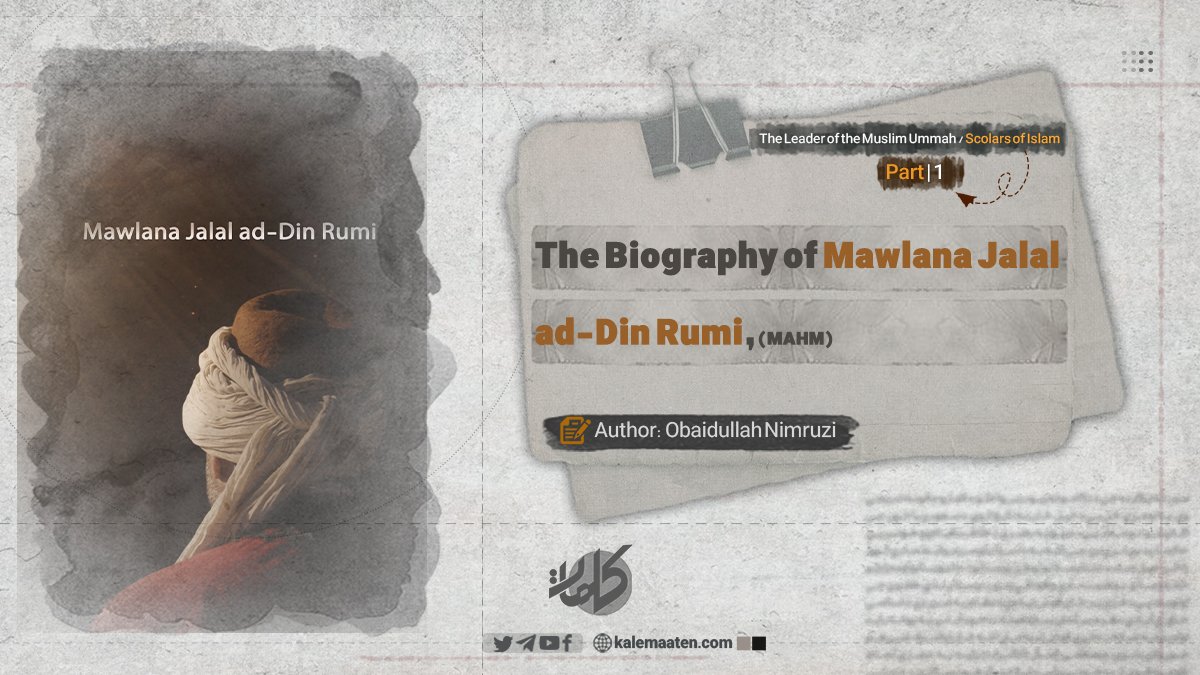
Author: Obaidullah Nimruzi
The Biography of Mawlana Jalal ad-Din Rumi ‘may Allah have mercy on him’ (Part One)
Keywords: Jalal ad-Din, Rumi, Masnavi, Shams Tabrizi.
Abstract
Mawlana Jalal ad-Din Muhammad Balkhi Rumi was one of the great men and pioneers in the field of divine mysticism, purification, and the reform of the heart, who is best known for his precious work Masnavi Ma’navi. Mawlana Jalal ad-Din Rumi is originally from Afghanistan and was born in Balkh (present-day Balkh Province). When he eventually migrated to Eastern Rome (Konya), he became known as Mawlana Rumi.
Introduction
Without a doubt, the men and women of this nation are a clear example of the perfection of the religion of Islam and a decisive proof of the conclusion of the Prophethood of the Holy Prophet (peace and blessings of Allah be upon him). After several decades have passed since the death of the Holy Prophet (peace and blessings of Allah be upon him), the Islamic nation still stands strong, and the pure religion of Islam remains a guiding force in the world and the answer to all human needs until the Day of Judgment.
Undoubtedly, these blessings and favors are due to the people who have been inspired by the teachings of Muhammad (peace and blessings of Allah be upon him). The Holy Prophet (peace and blessings of Allah be upon him) says in a hadith: “By the passing of every century, Allah Almighty chooses people from among the Islamic nation to renew its religion and keep it away from superstitions and innovations.” This blessed series will continue until the Day of Judgment. The Islamic nation has witnessed and continues to witness various renewals, both in external sciences and in mystical and esoteric teachings.
Throughout history, many great men have risen to prominence and renewed various aspects and branches of religion. One of the most distinguished figures in this field is Hazrat Mawlana Jalal ad-Din Balkhi Rumi. Yes, without a doubt, on this earth and in this celestial realm where humanity and living beings reside, there have been elite personalities, scholars, and exceptional thinkers whose enlightened thoughts have bestowed immense grace and blessings upon human society. One of these esteemed thinkers and unique poets is Mawlana Jalal ad-Din Muhammad Balkhi Rumi, who was born in Balkh, the birthplace of other luminaries, into a family of scholars and mystics.
Although discussing and especially writing about such great human figures requires high scholarly capacity, exceptional abilities, and extensive research—qualities which I humbly acknowledge I do not possess—my boundless interest and enthusiasm for the great personality and thinker of the East, Mawlana Jalal ad-Din Muhammad Balkhi Rumi, compelled me to compile some material using accessible library resources and present it to the admirers of Mawlana.
Poet (Translation):
The expression of knowledge emanates from every speech of Rumi.
the heart is touched by the elevation of every thought of Rumi.
If you seek a mystic, come and witness the eloquence in Rumi’s work.
Rumi’s Journey with Sultan Al-Ulama
Rumi emigrated from his birthplace with his noble father and family due to various factors, eventually settling in “Konya,” one of the major cities of present-day Turkey. Rumi’s father, Muhammad bin Hussein Khatibi, nicknamed Bahauddin or Sultan Al-Ulama, was also a prominent scholar and orator from Balkh, and their ancestors hailed from the ancient region of Khorasan.
Masnavi: The Source of Honor for the People of the East
His precious works, especially Masnavi Ma’navi and Diwan Shams, have captivated the public so profoundly that they have astonished their admirers and have brought honor and pride to the East and, indeed, to the entire world.
The Masnavi: The Enlightener of Humanity
Rumi’s teachings concerning the quest for knowledge and truth-seeking, along with his poems and mystical masterpieces, have been unparalleled. Some have even termed his famous work, Masnavi Ma’navi, “the polisher of souls.”
Characteristics of the Content of Masnavi
Masnavi Ma’navi, compiled in six volumes, consists of a collection of mystical, moral, and religious thoughts, as well as interpretations of some verses from the Holy Quran and Prophetic hadiths. Until the age of 38, Rumi dedicated himself to studying Islamic mystical sciences, teaching, and preaching according to the wishes of his father, the demands of society, and the guidance of his great teacher, Sayyid Burhanuddin Mohaqiq Tirmidhi. His followers took him from school to school and from pulpit to pulpit, making optimal use of his sermons and significant teachings, which were well received.
Rumi’s Meeting with Shams Tabrizi
However, after meeting Shams Tabrizi (may Allah have mercy on him), Rumi found himself immersed in a dream of seeking truth and filled with love and passion. He longed for someone to liberate him from the narrow and dry confines of the temporal world and to guide him to the fiery realm of divine love, a wish fulfilled by his encounter with Shams Tabrizi.
The truth is that his relationship with Shams is considered a pivotal turning point in Rumi’s life and conduct. The profound and transformative nature of their connection is shrouded in mystery.
This strange, mysterious, and passionate encounter with Shams stirred a tempest within Rumi’s soul and spirit, driving him toward communion with the Absolute Being. After meeting and associating with Shams, Rumi became not only unified and ecstatic but also turned his focus away from preaching, teaching, and the mundane discussions of the school to composing poetry that polished the souls of seekers.
Shams Tabrizi, who ignited such enthusiasm in Rumi, was himself an enigmatic mystic who found no solace and wandered from city to city. He too yearned for a spark that would ignite his passion.
Though Shams did not spend long with Rumi and was not in contact with him for many years, in this brief time, he transformed Rumi into such a mystic and lover of knowledge and truth that his equal could scarcely be found.
Continues…


